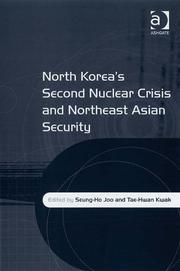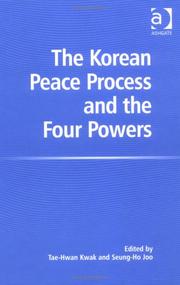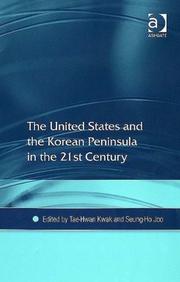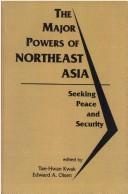| Listing 1 - 10 of 10 |
Sort by
|
Book
ISBN: 9780754677390 9781315247861 9781351914314 0754677397 Year: 2009 Publisher: Farnham: Ashgate,
Abstract | Keywords | Export | Availability | Bookmark
 Loading...
Loading...Choose an application
- Reference Manager
- EndNote
- RefWorks (Direct export to RefWorks)
International relations. Foreign policy --- North Korea --- Kim, Chŏng-il, --- Korea (North) --- Foreign relations --- K9560 --- Korea: International politics, law and relations of North Korea -- general, world and transregional --- Kim, Jong Il, --- Kin, Shōnichi, --- Chin, Cheng-jih, --- Kim, Djeund Il, --- Il, Kim Djeung, --- Ir, Kim Chen, --- Kim, Chen Ir, --- 金正一, --- 金正日, --- 김 정일, --- 김정일, --- Kaṅʻmʻ, Gyuṃʼī, --- Korean People's Republic --- People's Democratic Republic of Korea --- Koreĭskai︠a︡ Narodno-Demokraticheskai︠a︡ Respublika --- Korea (North Korean Government) --- Democratic People's Republic of Korea --- KNDR --- Chʻao-hsien min chu chu i jen min kung ho kuo --- Koreai Népi Demokratikus Köztársaság --- Korea (Democratic People's Republic) --- K.N.D.R. --- K.R.L.D. --- Korea (People's Democratic Republic) --- Korean People's Democratic Republic --- Chōsen Minshu Shugi Jinmin Kyōwakoku --- Chosŏn Minjujuŭi Inmin Konghwaguk --- KRLD --- Koreańska Republika Ludowo-Demokratyczna --- Kūriyā al-Dīmuqrāṭīyah --- D.P.R.K. --- DPRK --- Corée du Nord --- República Popular Democrática de Corea --- Corea (North) --- North Korean Interim Government --- Chosun Minchu-chui Inmin Konghwa-guk --- Foreign relations. --- Chaoxian minzhu zhuyi renmin gongheguo --- 朝鲜民主主义人民共和国 --- 金 正日, --- Kim, Chŏng-il, - 1942-2011 --- Korea (North) - Foreign relations --- Kim, Jong Il --- Kim Jong Il --- Kim, Djeung Il --- Kim Djeung Il --- Kim, Chŏng-il --- Gim, Jeong-il --- 김, 정일 --- 金, 正日

ISBN: 1317086597 1317086589 128120885X 9786611208851 0754688712 9780754688716 0754671763 9780754671763 9781317086598 9781317086581 6611208852 9781315598581 9781317086574 1315598582 Year: 2007 Publisher: Aldershot, England ; Burlington, VT : Ashgate,
Abstract | Keywords | Export | Availability | Bookmark
 Loading...
Loading...Choose an application
- Reference Manager
- EndNote
- RefWorks (Direct export to RefWorks)
This key volume provides in-depth analysis of the inter-Korean and international dynamics of North Korea's nuclear crisis. It offers new insights into the six-party talks designed to resolve the crisis, suggests creative formulas to resolve the ongoing crisis and delves into the interests and policies of the major powers at the six-party negotiating table.
Nuclear arms control --- Nuclear weapons --- Nuclear weapons control --- Arms control --- Six-party Talk. --- 6-cha Hoedam --- 6-party Talk --- Korea (North) --- Korea (South) --- Korean People's Republic --- People's Democratic Republic of Korea --- Koreĭskai︠a︡ Narodno-Demokraticheskai︠a︡ Respublika --- Korea (North Korean Government) --- Democratic People's Republic of Korea --- North Korea --- KNDR --- Chʻao-hsien min chu chu i jen min kung ho kuo --- Koreai Népi Demokratikus Köztársaság --- Korea (Democratic People's Republic) --- K.N.D.R. --- K.R.L.D. --- Korea (People's Democratic Republic) --- Korean People's Democratic Republic --- Chōsen Minshu Shugi Jinmin Kyōwakoku --- Chosŏn Minjujuŭi Inmin Konghwaguk --- KRLD --- Koreańska Republika Ludowo-Demokratyczna --- Kūriyā al-Dīmuqrāṭīyah --- D.P.R.K. --- DPRK --- Corée du Nord --- República Popular Democrática de Corea --- Corea (North) --- North Korean Interim Government --- Chosun Minchu-chui Inmin Konghwa-guk --- Chaoxian minzhu zhuyi renmin gongheguo --- 朝鲜民主主义人民共和国 --- Foreign relations. --- Foreign relations
Book
ISBN: 1317086627 1317086619 1472417879 9781472417879 1472417887 9781472417886 9781472417862 1472417860 9781472417886 9781315598574 9781317086604 9781317086611 9781138246232 1315598574 Year: 2016 Publisher: London : Routledge,
Abstract | Keywords | Export | Availability | Bookmark
 Loading...
Loading...Choose an application
- Reference Manager
- EndNote
- RefWorks (Direct export to RefWorks)
This book explores the domestic factors of the two Koreas and the four major powers that influence their security policies towards North Korea and Northeast Asia. This well thought out and consistently analysed volume has huge potential to frame the conversation on Northeast Asian relations in the coming years.
Security, International --- East Asian cooperation. --- Asian cooperation --- Collective security --- International security --- International relations --- Disarmament --- International organization --- Peace --- Korea (North) --- East Asia --- Korean People's Republic --- People's Democratic Republic of Korea --- Koreĭskai︠a︡ Narodno-Demokraticheskai︠a︡ Respublika --- Korea (North Korean Government) --- Democratic People's Republic of Korea --- North Korea --- KNDR --- Chʻao-hsien min chu chu i jen min kung ho kuo --- Koreai Népi Demokratikus Köztársaság --- Korea (Democratic People's Republic) --- K.N.D.R. --- K.R.L.D. --- Korea (People's Democratic Republic) --- Korean People's Democratic Republic --- Chōsen Minshu Shugi Jinmin Kyōwakoku --- Chosŏn Minjujuŭi Inmin Konghwaguk --- KRLD --- Koreańska Republika Ludowo-Demokratyczna --- Kūriyā al-Dīmuqrāṭīyah --- D.P.R.K. --- DPRK --- Corée du Nord --- República Popular Democrática de Corea --- Corea (North) --- North Korean Interim Government --- Chosun Minchu-chui Inmin Konghwa-guk --- Chaoxian minzhu zhuyi renmin gongheguo --- 朝鲜民主主义人民共和国 --- Strategic aspects. --- Foreign relations --- East Asian cooperation --- K9549 --- K9554.10 --- K9561.10 --- K9561.14 --- K9564.11 --- Korea: International politics, law and relations -- North-South relation --- Korea: International politics, law and relations -- North America --- Korea: International politics, law and relations of North Korea -- East Asia --- Korea: International politics, law and relations of North Korea -- Asia -- China --- Korea: International politics, law and relations of North Korea -- North America -- United States --- United States --- Asia, East --- Asia, Eastern --- East (Far East) --- Eastern Asia --- Far East --- Orient --- East Asia.

Abstract | Keywords | Export | Availability | Bookmark
 Loading...
Loading...Choose an application
- Reference Manager
- EndNote
- RefWorks (Direct export to RefWorks)
Peace --- World politics --- East Asia --- Korea (North) --- Korea (South) --- Foreign relations.
Book
Abstract | Keywords | Export | Availability | Bookmark
 Loading...
Loading...Choose an application
- Reference Manager
- EndNote
- RefWorks (Direct export to RefWorks)
Korean reunification question (1945- ) --- National security --- Peace-building --- Security, International
Book
ISBN: 1315599848 1317082818 131708280X 1282575619 9786612575617 1409407209 9781409407201 1409407195 9781409407195 9781409407195 9781317082811 9781282575615 6612575611 Year: 2010 Publisher: Burlington, VT Ashgate.
Abstract | Keywords | Export | Availability | Bookmark
 Loading...
Loading...Choose an application
- Reference Manager
- EndNote
- RefWorks (Direct export to RefWorks)
Presents a two-track (inter-Korean and international) approach to Korean peninsula peace-regime building.
Peace-building --- National security --- Security, International --- Korean reunification question (1945- )
Book
ISBN: 9781472476142 147247614X 9781138361355 1138361356 Year: 2018 Publisher: London Routledge
Abstract | Keywords | Export | Availability | Bookmark
 Loading...
Loading...Choose an application
- Reference Manager
- EndNote
- RefWorks (Direct export to RefWorks)
"On the Korean peninsula, there exist two sovereign states--the Republic of Korea (ROK or South Korea) and the Democratic People's Republic of Korea (DPRK or North Korea)--both of whom hold separate membership at the United Nations. This book discusses the construction of "one Korea" and highlights the potential benefits of unification for the Koreans and the international community. Arguing that Korean unification is intrinsically international in nature, the authors outline how the process and outcome would impact upon the policies of the four major powers--the U.S., China, Russia, and Japan. In addition, the authors highlight the possible far-reaching repercussions of unification on the political and economic dynamics of Northeast Asia. Making a case for the two Koreas and interested powers to plan and orchestrate their acts for sustained peace and gradual unification on the Korean peninsula, this book examines the Korean question and the related issue of peace building in Northeast Asia from a global perspective. It will be of interest to students and scholars researching politics and international relations."--Provided by publisher.
Korean reunification question (1945- ) --- International relations --- International cooperation --- Korea (South) --- Korea (North) --- Relations --- Foreign relations

ISBN: 0754648133 Year: 2006 Publisher: Aldershot, UK : Ashgate,
Abstract | Keywords | Export | Availability | Bookmark
 Loading...
Loading...Choose an application
- Reference Manager
- EndNote
- RefWorks (Direct export to RefWorks)
Book

ISBN: 9781685858018 1685858015 Year: 2023 Publisher: Boulder
Abstract | Keywords | Export | Availability | Bookmark
 Loading...
Loading...Choose an application
- Reference Manager
- EndNote
- RefWorks (Direct export to RefWorks)
The contributors examine the security policies of Japan, China, Russia, the United States, and Australia toward Northeast Asia in the context of the ongoing problems of the Korean peninsula.


ISBN: 9781685858018 9781555875664 Year: 2023 Publisher: Boulder Lynne Rienner Publishers
Abstract | Keywords | Export | Availability | Bookmark
 Loading...
Loading...Choose an application
- Reference Manager
- EndNote
- RefWorks (Direct export to RefWorks)
| Listing 1 - 10 of 10 |
Sort by
|

 Search
Search Feedback
Feedback About UniCat
About UniCat  Help
Help News
News